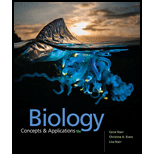
Concept explainers
A chromosome contains many different gene regions that are transcribed into different ________.
| a. proteins | c.
|
| b. polypeptides | d.
|
Introduction:
There is a variety of living organisms that are present in the environment. Most of the organisms contain a nucleus in which the genetic material is stored. The genetic material plays a very crucial role in the functions of the organism. A chromosome is a part of genetic material that contains genes. It is present in the nucleus.
Answer to Problem 1SA
Correct answer:
The regions of a chromosome that contains genes are transcribed into
Explanation of Solution
Reason for correct answer:
Option c. is given as “
Reason for incorrect answer:
Option a. is given as, “proteins.”
The process of producing proteins from the information present in the genes is called translation. However, transcription does not include the conversion of information present in the genes into proteins. Hence, option a. is incorrect.
Option b. is given as, “polypeptides.”
The units that join amino acids together to form protein molecules are called polypeptides. This type of conversion is not observed during transcription. However, the process of formation of polypeptides from the information present in the genes is called translation and not transcription. Hence, option b. is incorrect.
Option d. is given as, “
A nucleotide contains three constituents that are “pentose sugar (deoxyribose), nitrogenous bases and a phosphate group.” Many nucleotides join together to form a polymer called as nucleic acid.
Hence, the options a., b., and d. are incorrect.
The genes present on the chromosomes are transcribed into
Want to see more full solutions like this?
Chapter 9 Solutions
Biology: Concepts and Applications (MindTap Course List)
- 1. In the following illustration of a phospholipid... (Chemistry Primer and Video 2-2, 2-3 and 2-5) a. Label which chains contain saturated fatty acids and non-saturated fatty acids. b. Label all the areas where the following bonds could form with other molecules which are not shown. i. Hydrogen bonds ii. Ionic Bonds iii. Hydrophobic Interactions 12-6 HICIH HICIH HICHH HICHH HICIH OHHHHHHHHHHHHHHHHH C-C-C-C-C-c-c-c-c-c-c-c-c-c-c-c-C-C-H HH H H H H H H H H H H H H H H H H H HO H-C-O H-C-O- O O-P-O-C-H H T HICIH HICIH HICIH HICIH HHHHHHH HICIH HICIH HICIH 0=C HIC -C-C-C-C-C-C-C-C-CC-C-C-C-C-C-C-C-C-H HHHHHHHHH IIIIIIII HHHHHHHH (e-osbiv)arrow_forwardAnswer this as a dental assistant studentarrow_forwardbuatkan judul skripsi tentang parasitologi yang sedang trendinharrow_forward
- Dental assistantarrow_forwardO Macmillan Learning Glu-His-Trp-Ser-Gly-Leu-Arg-Pro-Gly The pKa values for the peptide's side chains, terminal amino groups, and carboxyl groups are provided in the table. Amino acid Amino pKa Carboxyl pKa Side-chain pKa glutamate 9.60 2.34 histidine 9.17 1.82 4.25 6.00 tryptophan 9.39 2.38 serine 9.15 2.21 glycine 9.60 2.34 leucine 9.60 2.36 arginine 9.04 2.17 12.48 proline 10.96 1.99 Calculate the net charge of the molecule at pH 3. net charge at pH 3: Calculate the net charge of the molecule at pH 8. net charge at pH 8: Calculate the net charge of the molecule at pH 11. net charge at pH 11: Estimate the isoelectric point (pl) for this peptide. pl:arrow_forwardBiology Questionarrow_forward
- This entire structure (Pinus pollen cone) using lifecycle terminology is called what?arrow_forwardThis entire structure using lifecycle terminology is called what? megastrobilus microstrobilus megasporophyll microsporophyll microsporangium megasporangium none of thesearrow_forwardHow much protein should Sarah add to her diet if she gets pregnant? Sarah's protein requirements during pregnancy would be higher. See Hint B2. During calculations, use numbers rounded to the first decimal place. In your answer, round the number of grams to the nearest whole number. _______ g ?arrow_forward
- C MasteringHealth MasteringNu X session.healthandnutrition-mastering.pearson.com/myct/itemView?assignment ProblemID=17396422&attemptNo=1&offset=prevarrow_forwardMost people, even those who exercise regularly at low to average intensity (1 hour at the gym or a 2- to 3-mile walk several times per week), do not need an increased protein intake. What would be the protein needs of a man named Josh who exercises moderately and is the same age and size as Wayne? Josh is 5 ft, 8 in tall and weighs 183 lb. Round the number of grams to the nearest whole number. During calculations, use numbers rounded to the first decimal place. Because protein requirement is a range, please enter two numbers: lower and upper range values, respectively. Separate the lower and upper range values, in that order, by a comma. ___, ___ g ?arrow_forwardC MasteringHealth MasteringNu X session.healthandnutrition-mastering.pearson.com/myct/itemView?assignment ProblemID=17396422&attemptNo=1&offset=prevarrow_forwardarrow_back_iosSEE MORE QUESTIONSarrow_forward_iosRecommended textbooks for you

 Biology Today and Tomorrow without Physiology (Mi...BiologyISBN:9781305117396Author:Cecie Starr, Christine Evers, Lisa StarrPublisher:Cengage Learning
Biology Today and Tomorrow without Physiology (Mi...BiologyISBN:9781305117396Author:Cecie Starr, Christine Evers, Lisa StarrPublisher:Cengage Learning Concepts of BiologyBiologyISBN:9781938168116Author:Samantha Fowler, Rebecca Roush, James WisePublisher:OpenStax College
Concepts of BiologyBiologyISBN:9781938168116Author:Samantha Fowler, Rebecca Roush, James WisePublisher:OpenStax College Human Biology (MindTap Course List)BiologyISBN:9781305112100Author:Cecie Starr, Beverly McMillanPublisher:Cengage LearningEssentials of Pharmacology for Health ProfessionsNursingISBN:9781305441620Author:WOODROWPublisher:Cengage
Human Biology (MindTap Course List)BiologyISBN:9781305112100Author:Cecie Starr, Beverly McMillanPublisher:Cengage LearningEssentials of Pharmacology for Health ProfessionsNursingISBN:9781305441620Author:WOODROWPublisher:Cengage Biology (MindTap Course List)BiologyISBN:9781337392938Author:Eldra Solomon, Charles Martin, Diana W. Martin, Linda R. BergPublisher:Cengage Learning
Biology (MindTap Course List)BiologyISBN:9781337392938Author:Eldra Solomon, Charles Martin, Diana W. Martin, Linda R. BergPublisher:Cengage Learning

 Biology Today and Tomorrow without Physiology (Mi...BiologyISBN:9781305117396Author:Cecie Starr, Christine Evers, Lisa StarrPublisher:Cengage Learning
Biology Today and Tomorrow without Physiology (Mi...BiologyISBN:9781305117396Author:Cecie Starr, Christine Evers, Lisa StarrPublisher:Cengage Learning Concepts of BiologyBiologyISBN:9781938168116Author:Samantha Fowler, Rebecca Roush, James WisePublisher:OpenStax College
Concepts of BiologyBiologyISBN:9781938168116Author:Samantha Fowler, Rebecca Roush, James WisePublisher:OpenStax College Human Biology (MindTap Course List)BiologyISBN:9781305112100Author:Cecie Starr, Beverly McMillanPublisher:Cengage LearningEssentials of Pharmacology for Health ProfessionsNursingISBN:9781305441620Author:WOODROWPublisher:Cengage
Human Biology (MindTap Course List)BiologyISBN:9781305112100Author:Cecie Starr, Beverly McMillanPublisher:Cengage LearningEssentials of Pharmacology for Health ProfessionsNursingISBN:9781305441620Author:WOODROWPublisher:Cengage Biology (MindTap Course List)BiologyISBN:9781337392938Author:Eldra Solomon, Charles Martin, Diana W. Martin, Linda R. BergPublisher:Cengage Learning
Biology (MindTap Course List)BiologyISBN:9781337392938Author:Eldra Solomon, Charles Martin, Diana W. Martin, Linda R. BergPublisher:Cengage Learning
